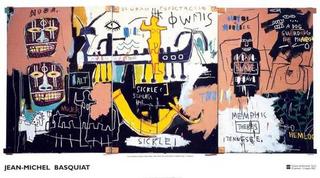
There's an exhibit of Jean-Michel Basquiat here at LA's MOCA, so we went. The artist's comments on racial injustice are tough to miss (rather than go into it I'll just say go see the exhibit if you're in town), and remind me of moving to New York City in the late 1980s, when, in the wake of Howard Beach and Bernard Goetz and the Central Park Jogger and Tawana Brawley and goodness, the list goes on and on -- race relations were a hot topic, with many people happy to throw in their two cents. Louis Farrakhan, Jesse Jackson, Al Sharpton, Chuck D and Public Enemy, students erecting and living in shanty villages on college campuses to protest America's investment in still-embracing-apartheid South Africa... Man. The gulf between black and white, and how to possibly narrow it, that was THE THING.
I myself was writing a play at the time about a black caddy working at an (obviously) white country club.
But that's not the embarrassing thing. The embarrassing thing is that I was looking at Basquiat's paintings, and seeing phrases he had written on them, like "the irony of a negro cop," and could not help the thought from formulating in my brain: "That's so dated." As in, awareness of racial inequalities -- so 80's, you know? Of course, it was very early 90's too, when you consider Rodney King et al. But the larger point looms, which is that nobody's standing up and making any noise about race relations these days, unless it's the relationship of red state voters to NASCAR. I guess that means that racial injustice is a thing of the past, right?
Maybe just in the eyes of this administration. Now. Before anyone thinks I'm about to go into an anti-Bush rant, I'm not. It's not that I don't think it's warranted, it's just that rants to me smack of two other things that start with R: rhetoric and rarely original. The objective truth of the matter is that Iraq is item #1 on the agenda with W, and I'm not sure what's second. Maybe it's terrorism. Maybe after that it's North Korea, Iran, the Supreme Court, drilling in Alaska, stem cell research, faith-based initiatives. I dunno, and I'm not judging. Because that would be rhetorical and rarely original, as I've said. What it brings up, and what I think is interesting, is exactly how much the administration's interests dictate what is perceived as relevant in our society. Sleeper cells, if you read the newspapers, are having more impact on our lives than white folks and black folks (not to mention everybody else) getting along.
I remember back in 2000, during the Democratic Primary, my-then-idol Bill Bradley was facing off against Al Gore. And I guess he had won an early caucus and was getting a lot of press. Bradley, having played ten years on a mostly-black basketball team (the Knicks) in a mostly-black league (the NBA) had sort of matured as a man with race and it's associated issues as a constant backdrop, and felt that they are at the core of what ills our country. As a result, his political agenda was starkly different to what we're experiencing today. "If I'm president, I want one thing to be known," Bradley said in an interview, "if you want to please the boss, one of the things you'd better show is how your department or agency has furthered tolerance and racial understanding."
If this sounds a little breathless, I'll also say that Bradley received a fair amount of criticism from black leaders for saying a lot and not doing so much. So who knows where we'd be if he was elected. But I'm pretty sure I would have reacted differently to the Basquiat show, for whatever that's worth.


